Carbohydrate ingestion rates during exercise: 90 vs 120 grams per hour – which is best?

I recently made a post on Instagram that got a lot of attention and questions, and it was one that compared the percentage efficiency of carbohydrate (CHO) ingestion when was taking 120 g of CHO per hour. There were a lot of questions, and of course it’s hard to explain in enough detail via an Instagram story (see below).
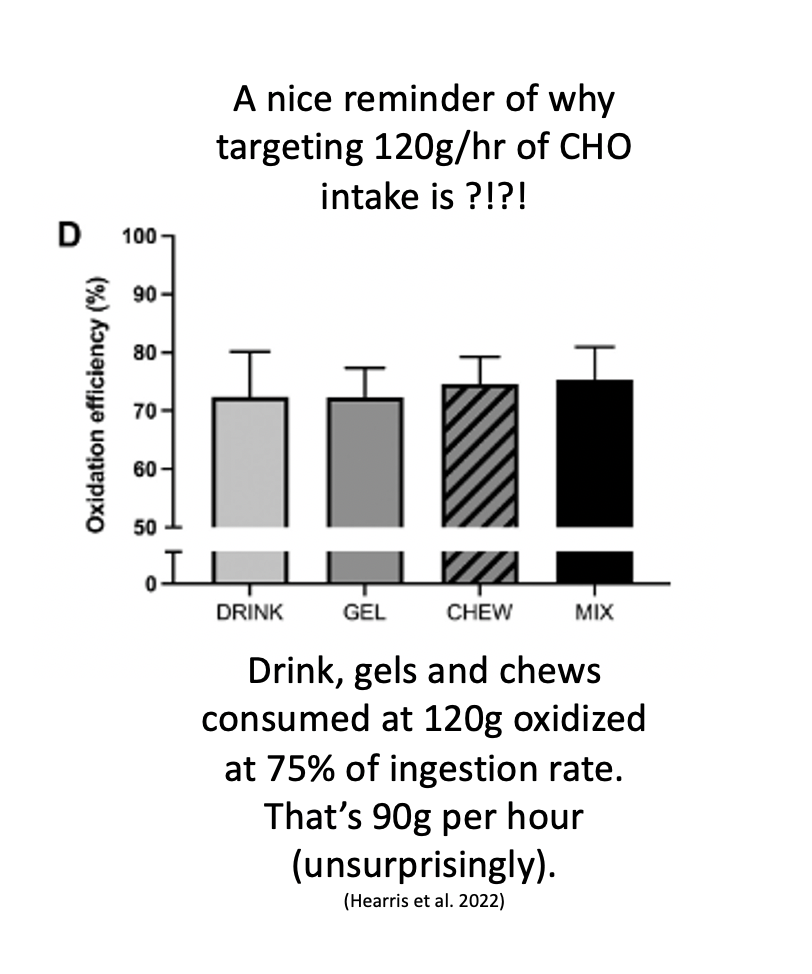 So, as such, in this blog, I am going to have a look at the emerging literature suggesting it may be possible to ingest carbohydrate at rates as high as 120 grams per hour during exercise (that’s ~5-6 gels!). Carbohydrate ingestion during training and racing has a long history in exercise physiology, sports nutrition, and endurance sport. Despite decades of research investigating the optimum dose, type, and form of carbohydrate to support performance, research is still emerging that challenges our practices. So, let’s get into it.
So, as such, in this blog, I am going to have a look at the emerging literature suggesting it may be possible to ingest carbohydrate at rates as high as 120 grams per hour during exercise (that’s ~5-6 gels!). Carbohydrate ingestion during training and racing has a long history in exercise physiology, sports nutrition, and endurance sport. Despite decades of research investigating the optimum dose, type, and form of carbohydrate to support performance, research is still emerging that challenges our practices. So, let’s get into it.
Why carbohydrate during exercise?
We have often discussed how whilst the body’s fat energy stores are vast and effectively limitless dur...
Right Fuel, Right Time – Carbohydrate Manipulation to Make Every Session Count!
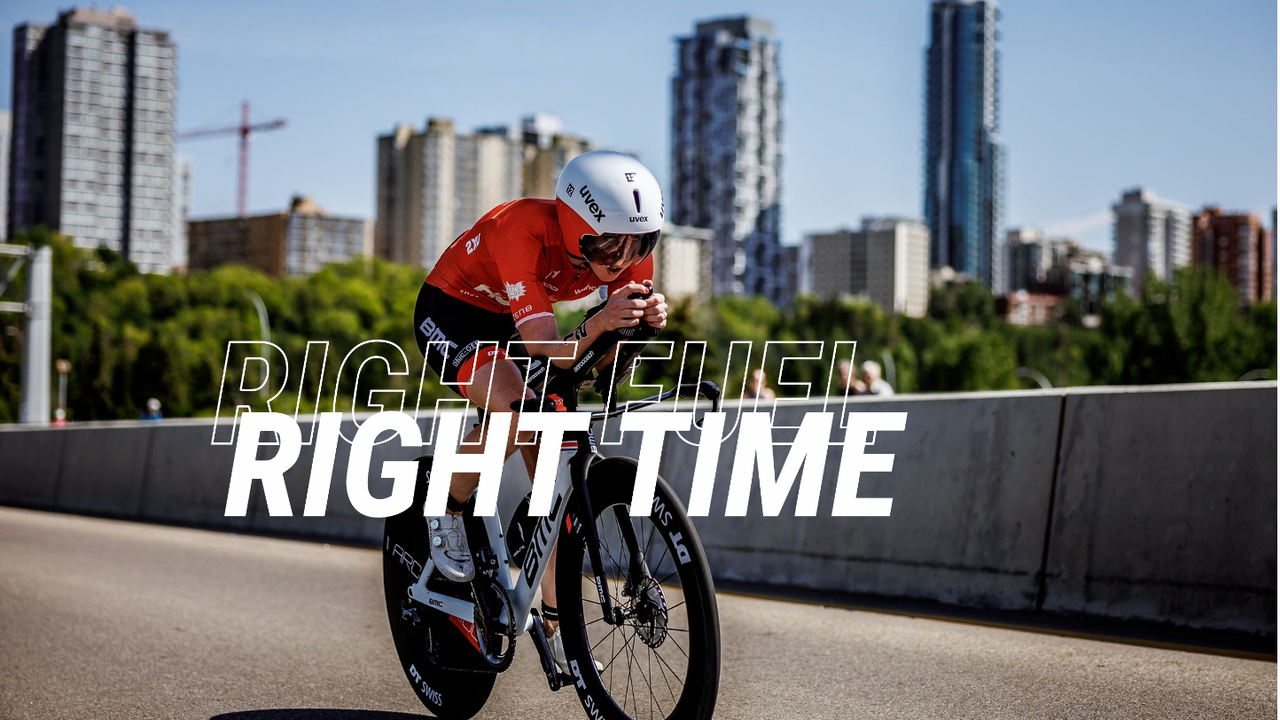
One of the hot topics in endurance sports nutrition at the moment is ‘carbohydrate periodization’ (4, 6).
What is carbohydrate periodization?
Like training periodization, in which we manipulate our training programming to best achieve our training objectives, carbohydrate periodization is a nutrition strategy in which carbohydrate intake is manipulated in line with training demands and to meet the objectives of individual sessions. These objectives may be to maximise acute performance within the session, or to facilitate high-fat oxidation rates, for example. We call this the ‘Right Fuel, Right Time’ approach. The rationale for this approach is that adequate carbohydrates should be consumed to support the quality of training sessions but that we should avoid overconsuming carbohydrates on easier, less demanding days, as this may blunt the signals that lead to positive adaptive responses (3).
In this blog, I will briefly discuss some of the research on the Right Fuel, Right Time appr...
Carbohydrate Nutrition: An update on hydrogels and in-race carbohydrate dosing
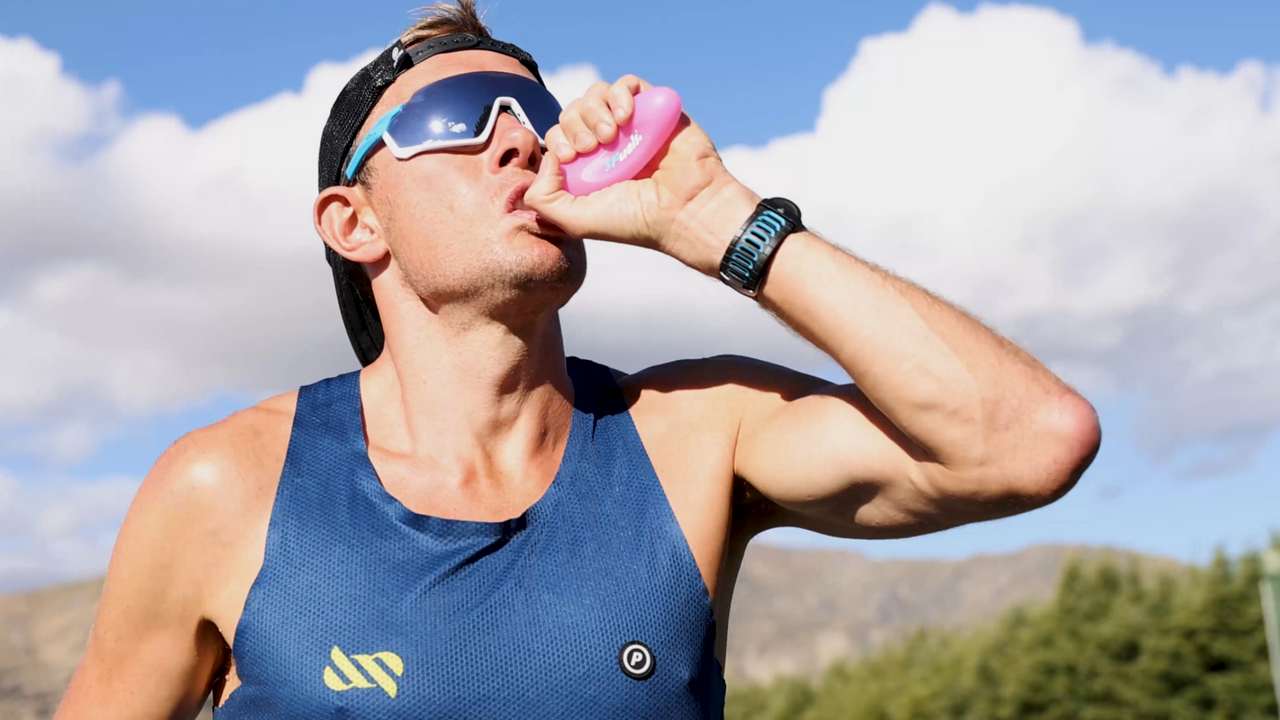
We discussed the science of carbohydrate ‘hydrogels’ in a previous blog. Carbohydrate hydrogels are regular carbohydrate-containing sports drinks, with pectin and sodium alginate added. Pectin and sodium alginate have little effect until the drink reaches the high acidity of the stomach, where it forms a gel-like mixture. The gel-like mixture allows for a faster pass through the stomach into the intestine – what is called ‘gastric emptying’ – and speeds the rate at which the ingested carbohydrate is available for absorption across the intestine and, theoretically, utilisation as a fuel source by the working muscles.
When I wrote the blog in 2020, a handful of studies looking at the gastrointestinal and metabolic effects of carbohydrate hydrogels had been published. My conclusion at that point was that hydrogels might provide an effective means of accelerating gastric emptying, although the research did not demonstrate positive effects on exogenous carbohydrate availability or gastroin...
Eating Before your Workout I Carbohydrate vs Protein vs Fasted

The question of “what should I eat before training”, is one that personally, I get asked a lot! Both by the athletes I coach, and by our Endure IQ education community (athletes and coaches). Up until now, I’ve always answered based on what I thought I knew, and what the literature pointed towards. However, to put it simply, the research just hasn’t been done in this space. That’s why I was super excited when I met my PhD student Jeff Rothschild nearly two years ago and learned this was the question he was eager to answer. I know what you’re thinking “this has surely been researched and already known?" Well, quite simply, it hasn’t, and certainly not in well-trained athletes.
As part of our quest to help figure out how we should be eating before exercise, I'm excited to share with you the findings from a new study from our lab that was just published, titled "Pre-Exercise Carbohydrate or Protein Ingestion Influences Substrate Oxidation but Not Performance or Hunger Compared with Cyclin...
CHO Supplementation for High Intensity Training in LCHF Long-Distance Triathletes: When and How
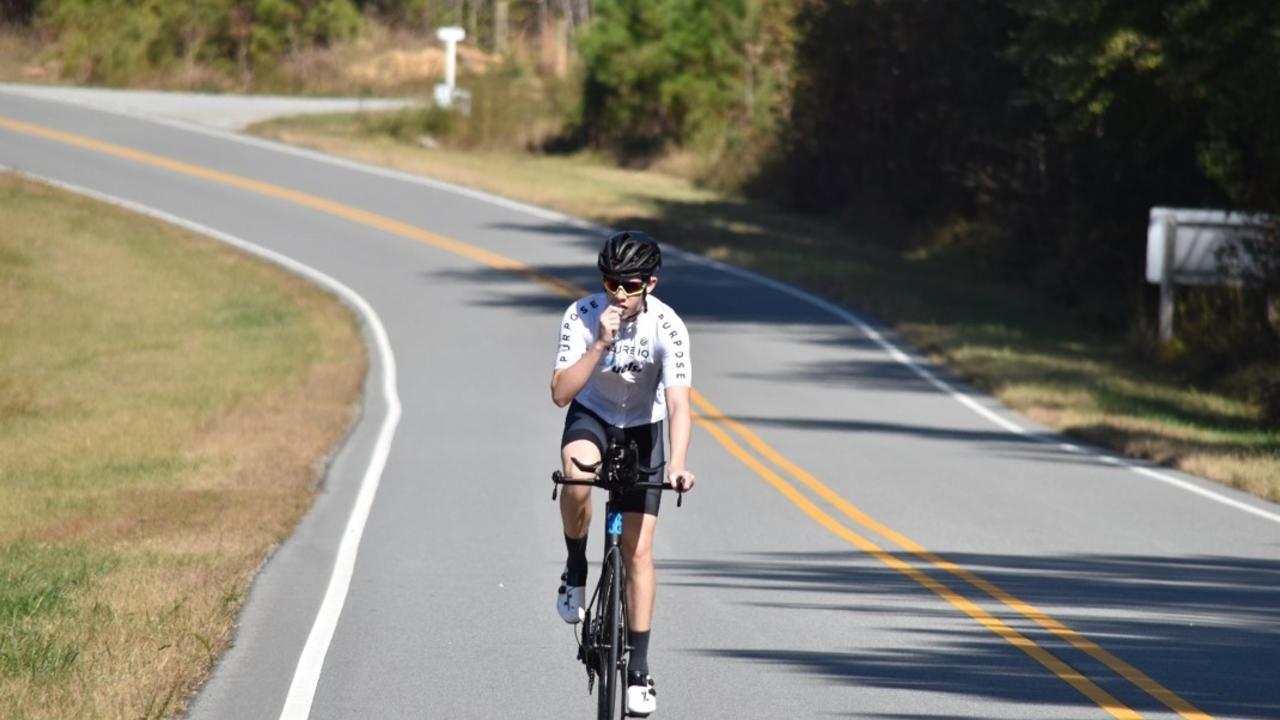
-Dr Dan Plews
By now, I hope all of our current and past LDT101 course enrolees are convinced of how important it is to maximise your capacity to make use of your effectively unlimited fat energy stores during long distance triathlon. As Prof. Grant nicely puts it during the course introduction in Endure IQ LDT101: The Practical Application of Low Carbohydrate Performance for Long Distance Triathlon, “the devil is in the detail!”. In this blog post, I am going to describe specific training situations in which using a small “carbohydrate booster” might be a useful tool in getting the best adaptive bang for your buck.
Background
As we have discussed previously, one of the main anxieties endurance athletes have before making the move to LCHF, is the possibility of suffering a loss of high-intensity performance. The strategy we set out in LDT101 should go some way to alleviating these anxieties but it is no secret that being able to access carbohydrate energy stores is importa...
Will my Carbohydrate Usage Change in Kona? How Heat Impacts Substrate Metabolism - Part 2

As we discussed in part one of this blog, our recently published study led by my PhD student Ed Maunder (5) identified that moderate environmental heat stress of 35°C and 60 % relative humidity stimulates our carbohydrate use during cycling, but probably only at high intensities rather than the more moderate Wattages we cycle at most of the time during an Ironman triathlon. Practically, this might mean that we are cautious to limit high intensity spikes during the World Championships in Kona where we face the dual threats of bonking, and high heat, given that this could theoretically spin our carbohydrate use to a much greater extent than at an Ironman taking place at a lower temperature.
The second part of that same study sought to examine these effects under both more extreme, and less extreme environmental heat stress, given the wide-ranging conditions we encounter on the Ironman circuit, at different events and also within the same event. For example, it’s well known that the temp...
Substrate Implications and Usage When Racing in the Heat - Heat Spins Glycogen - Part 1
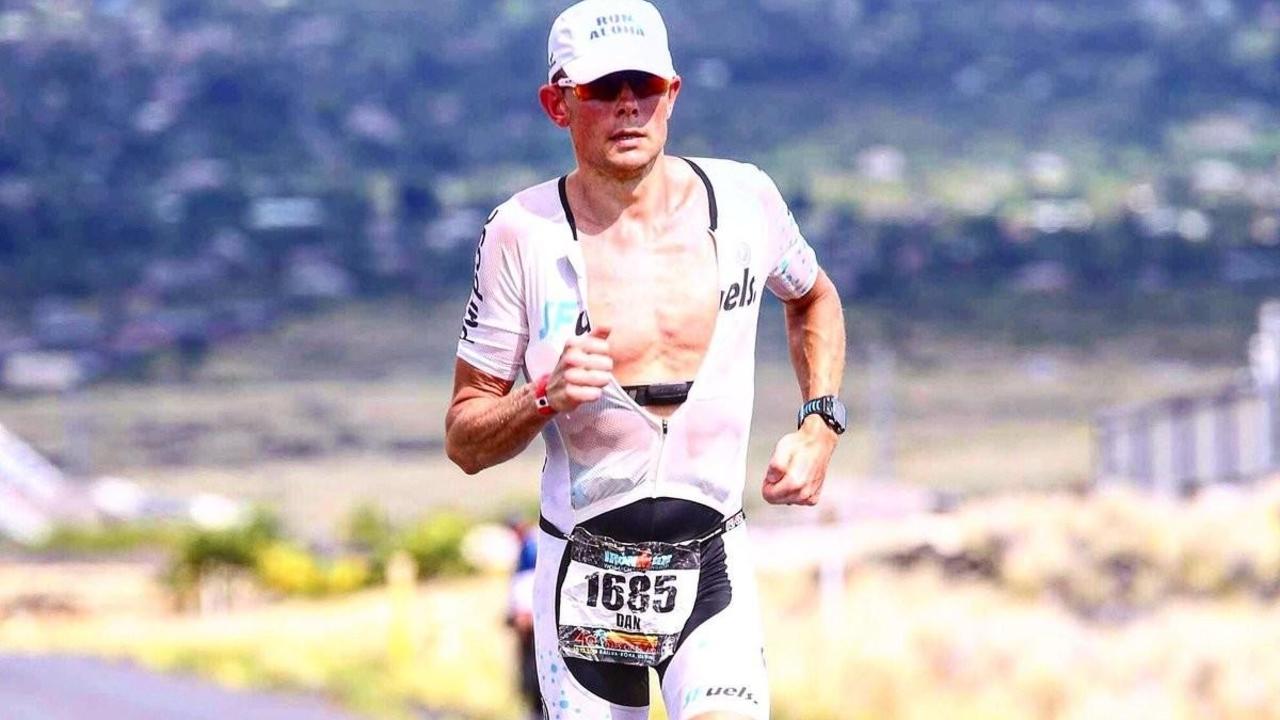
As all long-distance triathletes will know, a hot topic and key consideration when fine-tuning your preparation for the Ironman World Championships in Kona is heat. The effect of the high environmental temperatures encountered at The Big Dance on our physiology, psychology, and performance is so pronounced that we are actually putting together an entire course dedicated to it – LDT103, for which enrolments will open in May 2020.
This blog will summarize a recently published study conducted at AUT by my PhD student Ed Maunder (5), which focused on how acute heat stress impacts substrate metabolism during endurance exercise (i.e. fat vs carbohydrate use). We like to talk about this topic a lot and the implications of this study nicely link back to the important principles we outlined in our online course Endure IQ LDT101: The Practical Application of Low Carbohydrate Performance for Long Distance Triathlon. It’s undeniable that, reserving our limited carbohydrate energy stores during a ...
